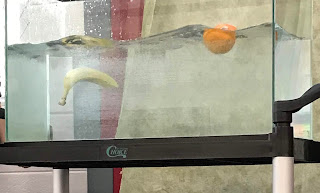Thursday, April 18, 2019
Instrument Making
This group of first graders (and one kindergartener) studied sound. Their engineering task after their study was to create an instrument that would play more than one pitch. Here they are playing their instruments as an orchestra:
Flowers in Second Grade
Second graders are learning all about flowers and pollinators. First they dissected flowers. Then they studied the features of specific pollinators and flowers to determine what makes a flower attractive to a particular pollinator. Below the photos is some of their writing.
Birds would be attracted to flower A. Flower A is tube-shaped. Birds use their beaks to reach inside flowers. Flower A blooms during the daytime. Birds visit flowers during the daytime. Flower A points down. Birds do not rest on the petals to eat. That's why birds would like flower A.
by Luke
Bats would like Flower F. Flower F blooms at night. Bats are active at night. Flower F has a strong musky smell. The smell of flower F helps bats find their way. Also bats like strong smells. Flower F is big and white. Bats are attracted to flowers that are big and white. Those are the reasons bats would like flower F.
by Olive
Moths are attracted to Flower C. Flower C has a sweet fragrant smell. Moths like sweet smells. Flower C blooms during the nighttime. Moths visit flowers during the nighttime. That's why moths like Flower C.
by Sia
Bats would like Flower F. Those flowers have a strong musky smell and they bloom during the nighttime. Bats are nocturnal so they would like night bloomers. Flower F is big so a bat can rest on it while it gets the nectar. Bats like white flowers because they are visible during the night. Bats are also attracted to the strong musky smell of Flower F. That's why bats like Flower F.
by Pasture
Flies are attracted to Flower D. Those flowers have a rotten and odious smell. Flies lay eggs on rotten and odious smells. Those flowers bloom during the day. That's why flies would like D.
by Sawyer
Birds would be attracted to Flower A. Flower A is tube-shaped. Birds use their beak to reach inside flowers. Birds visit flowers during the day. Flower A points down. Birds do not rest on the petals to eat. That's why birds would like A.
by Gavin
Birds would be attracted to flower A. Flower A is tube-shaped. Birds use their beaks to reach inside flowers. Flower A blooms during the daytime. Birds visit flowers during the daytime. Flower A points down. Birds do not rest on the petals to eat. That's why birds would like flower A.
by Luke
Bats would like Flower F. Flower F blooms at night. Bats are active at night. Flower F has a strong musky smell. The smell of flower F helps bats find their way. Also bats like strong smells. Flower F is big and white. Bats are attracted to flowers that are big and white. Those are the reasons bats would like flower F.
by Olive
Moths are attracted to Flower C. Flower C has a sweet fragrant smell. Moths like sweet smells. Flower C blooms during the nighttime. Moths visit flowers during the nighttime. That's why moths like Flower C.
by Sia
Bats would like Flower F. Those flowers have a strong musky smell and they bloom during the nighttime. Bats are nocturnal so they would like night bloomers. Flower F is big so a bat can rest on it while it gets the nectar. Bats like white flowers because they are visible during the night. Bats are also attracted to the strong musky smell of Flower F. That's why bats like Flower F.
by Pasture
Flies are attracted to Flower D. Those flowers have a rotten and odious smell. Flies lay eggs on rotten and odious smells. Those flowers bloom during the day. That's why flies would like D.
by Sawyer
Birds would be attracted to Flower A. Flower A is tube-shaped. Birds use their beak to reach inside flowers. Birds visit flowers during the day. Flower A points down. Birds do not rest on the petals to eat. That's why birds would like A.
by Gavin
Saturday, March 30, 2019
The Engineering Design Process with Third Graders: Designing Bridges
Please watch our video to learn what we did:
Here's a preview:
Tuesday, March 12, 2019
Kindergarteners Are Learning About Penguins
Here they are sorting vocabulary words into three categories: what they eat, how they move, and parts of their body.
2nd Grade Geometry with Bubbles
The second graders have been learning about 2-dimensional and 3-dimensional shapes. We made 3-D figures out of straws and pipe cleaners and then dipped them in bubbles to see what shapes the bubbles made.
Thursday, February 14, 2019
Will it float?
These sixth graders studied density to learn why things float. They used this knowledge with an engineering task where they had to build a boat out of aluminum foil and accurately predict how many pennies it would hold. Here they are playing the "Will it float?" game with the entire school at school sing.
Subscribe to:
Posts (Atom)



























